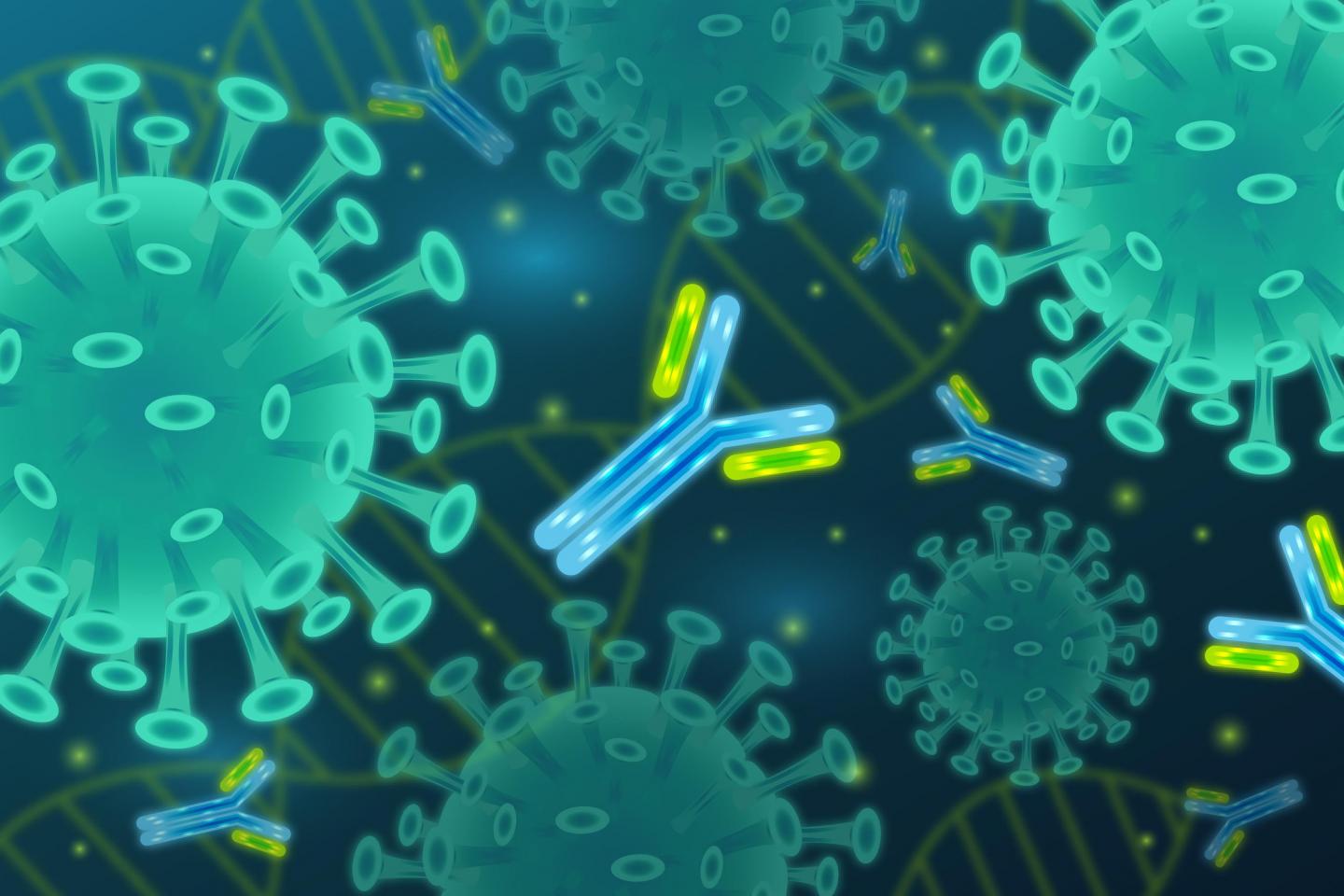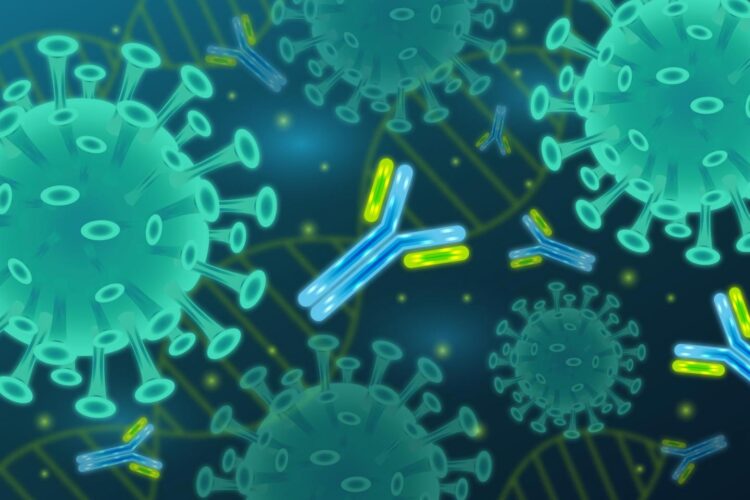Scientists perform the first detailed analysis of different antibodies produced by COVID patients to various parts of SARS-CoV-2

Credit: Fujita Health University
The COVID-19 pandemic has now claimed over 2 million deaths worldwide, and this number is only increasing. In response, health agencies have rolled out tests to diagnose and understand the disease. Besides the now widely known PCR test, there is interest in serological (blood) tests that detect “antibodies” against SARS-CoV-2, the virus that causes COVID-19. These blood tests have considerable applications, from identifying blood donors with high levels of anti-SARS-CoV-2 antibodies, whose blood can be used for convalescent plasma therapy, to measuring vaccine effectiveness.
So, what are antibodies? These are proteins produced by the body’s immune system to combat foreign proteins, such as the SARS-CoV-2 virus. Antibodies function by binding to a specific part of the virus that the immune system recognizes, called “antigens.” SARS-CoV-2 is composed of four major proteins, with two being highly immunogenic (capable of producing an immune response). These immunogenic proteins are called spike (S) and nucleocapsid (N) proteins. Presence of antibodies specific to the S protein means there is a higher amount of virus-neutralizing activity while antibodies specific to N protein indicate the presence of previous SARS-CoV-2 infection.
Despite this general awareness, we actually have only a vague understanding of how different antibodies (or antibody “isotypes”) interact with the various antigens produced by SARS-CoV-2. Hence, a team of scientists led by Senior Assistant Professor Hidetsugu Fujigaki and Professor Yohei Doi from Fujita Health University, in collaboration with National Institute of Infectious Diseases, Japan, FUJIFILM Wako Pure Chemical Corporation, and FUJIFILM Corporation undertook the first detailed investigation of these interactions. “Our goal was to quantify the neutralizing activity of these different antibodies against SARS-CoV-2,” Dr. Fujigaki explains, “We looked at antibodies specific to different parts of the S protein and the N protein to determine which of them was the best predictor of stopping the virus.”
They did this through an analysis of blood samples from 41 COVID-19 patients at the Fujita Health University Hospital. The team developed assays using three common antibodies (IgG, IgM, and IgA), each of them split into isotypes that bind specifically to five antigens (three parts of the S protein, including the receptor binding domain [RBD], the full S protein, and the full N protein).
The results of their experiments showed that all antibody isotypes that bind to the S protein (full and parts) were highly specific, but antibody isotypes binding to the N protein were less so. With minor variations, all antibodies are detectable in patients at approximately 2 weeks after symptoms appear, and detection sensitivity was higher than 90% (except in the case of IgM binding to N protein). Importantly, the researchers showed that IgG specific to the RBD of S protein had the highest correlation with virus neutralizing activity and disease severity. In other words, measuring RBD-specific IgG levels could tell us a lot about the immune response of COVID-19 patients, and could be the foundation for improving COVID-19 blood tests.
“We are also very excited by our findings because of their implications for convalescent serum/plasma therapy, a type of treatment where you transfuse blood from people who recovered from COVID and have high levels of antibodies against SARS-CoV-2,” Dr. Fujigaki adds, “Being able to show that the IgG antibody against RBD is highly correlated with neutralizing activity means we can identify appropriate blood donors for this treatment.”
The world is hopefully moving into the final stages of the pandemic, and this information could be the tools needed to carve out the final few steps to a safe post-pandemic world.
###
Reference
Title of original paper: Comparative analysis of antigen-specific anti-SARS-CoV-2 antibody isotypes in COVID-19 patients
Journal: Journal of Immunology
DOI: https:/
About Fujita Health University
Fujita Health University is a private university situated in Toyoake, Aichi, Japan. It was founded in 1964 and houses one of the largest teaching university hospitals in Japan in terms of the number of beds. With over 900 faculty members, the university is committed to providing various academic opportunities to students internationally. Fujita Health University has been ranked eighth among all universities and second among all private universities in Japan in the 2020 Times Higher Education (THE) World University Rankings. THE University Impact Rankings 2019 visualized university initiatives for sustainable development goals (SDGs). For the “good health and well-being” SDG, Fujita Health University was ranked second among all universities and number one among private universities in Japan. The university will also be the first Japanese university to host the “THE Asia Universities Summit” in June 2021. The university’s founding philosophy is “Our creativity for the people (DOKUSOU-ICHIRI),” which reflects the belief that, as with the university’s alumni and alumnae, current students also unlock their future by leveraging their creativity.
Website: https:/
About Senior Assistant Professor Hidetsugu Fujigaki from Fujita Health University
Dr. Hidetsugu Fujigaki is part of the Department of Disease Control and Prevention at the Fujita Health University Graduate School of Health Sciences. He is an author on over 20 publications. His work is centered on assay development for new biomarkers and lead discovery for drug development to advance human health.
About Prof. Yohei Doi from Fujita Health University
Dr. Yohei Doi, M.D., Ph.D., is a Professor at the Departments of Microbiology and Infectious Diseases at Fujita Health University School of Medicine and the Director of the Center for Innovative Antimicrobial Therapy at the University of Pittsburgh. He has authored 226 publications and has served on several journals’ editorial boards. He has led a clinical trial of the flu drug “Avigan” (favipiravir) as a potential treatment for COVID-19 at Fujita Health University.
Funding information
This study was supported in part by Grants-in-Aid from the Japan Agency for Medical Research and Development (grant numbers: AMED, JP19fk0108110 and JP19fk0108150). It was also funded by FUJIFILM Wako Pure Chemical Corporation.
Media Contact
Hidetsugu Fujigaki
[email protected]
Original Source
https:/
Related Journal Article
http://dx.





